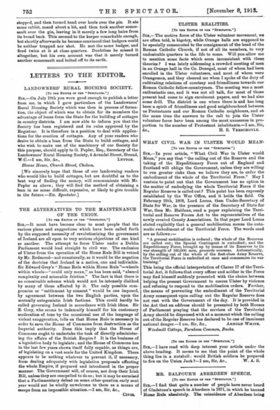WHAT CIVIL WAR IN ULSTER WOULD MEAN.
[To TEE EDITOR OF THE "SPECTATOR."] SIR,—In your article, "What Civil War in Ulster would Mean," you say that "the calling out of the Reserve and the taking of the Expeditionary Force out of England and Scotland will oblige the Government, unless they are willing to run greater risks than we believe they are, to order the embodiment of the whole of the Territorial Force." May I venture to point out that the Government has no option in the matter of embodying the whole Territorial Force if the Regular Reserve is called out ? This point has been expressly established by the War Office, and it holds the field. On February 28th, 1908, Lord Lucas, then Under-Secretary of State for War, in the presence of the Secretary of State for War, then Mr. Haldane, read a paper explaining the Terri torial and Reserve Forces Act to the representatives of the newly created County Associations. In that paper Lord Lucas stated explicitly that a general mobilisation means the automatic embodiment of the Territorial Force. The words used are as follows :—
"A general mobilisation is ordered ; the -whole of the Reserves are called out ; the Special Contingent is embodied ; and the Expeditionary Force, brought up by means of its Reserves to its war strength of 160,000 men, proceeds overseas. Automatically, by the calling out of the whole of the first-class Army Reserve, the Territorial Force is embodied at once and commences its war training." This being the official interpretation of Clause 17 of the Terri torial Act, it follows that every officer and soldier in the Force may find himself suddenly presented with the choice between helping the present Government to coerce Ulster by violence and refusing to respond to the mobilisation orders. Further, the means of preventing the embodiment of the Territorial Army consequent upon calling out the Regular Reserve does not rest with the Government of the day. It is provided in the Act that an address should be presented by both Houses of Parliament praying that the services of the Territorial Army should be dispensed with at a moment which the calling out of the Regular Reserve has declared to be one of imminent
national danger.—I am, Sir, &c., ARNOLD WHITE. Windmill Cottage, Farnham Common, Bucks. [To THE EDITOR OF TEE "SPECTATOR.") SIR,—I have read with deep interest your article under the above heading. It seems to me that the point of the whole thing lies in a nutshell : would British soldiers be prepared
to fire on the Union Jack ?—I am, Sir, &c., W. A. S. (•■•••■••• •••■


















































 Previous page
Previous page